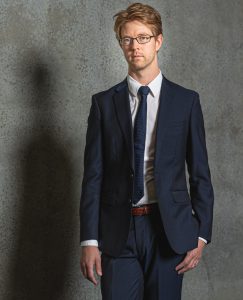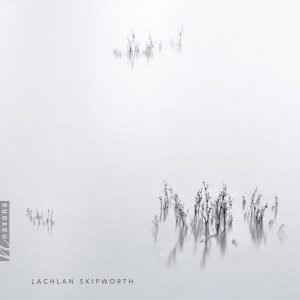Becoming a composer often requires a long apprenticeship, but composer Lachlan Skipworth’s career is hitting full stride. The winner of the 2016 Paul Lowin Prize has released his debut album and it features a stellar line up of local and international musicians performing his chamber music. He chats with Rosalind Appleby about the endless chase for the perfect listening experience.
Rosalind Appleby: You’ve learned both clarinet and shakuhachi and studied with composers ranging from English modernist Roger Smalley to the Asian-influenced Australian Ann Boyd and avant-garde German Jörg Widmann. As a composer that is a vast range of experiences to draw on, yet you fuse them together to create such an original and beautiful voice. What is your secret??
Lachlan Skipworth: I suspect the “secret” is listening. I thirst for music that moves me physically and emotionally, as I believe music’s role is to strengthen us, to uplift us. Look at how profoundly it impacts infants, children and the elderly. And for me, endlessly chasing a “perfect” listening experience built a strong sense of my own personal aesthetic preference. So the constant challenge of creating music that lives up to this vision is what drives my artistic journey. Clarinet and shakuhachi skew my voice towards a certain purity and subtle nuance, and memorising shakuhachi honkyoku in particular left an lasting impression on my musical instincts. My composition teachers all played an important part in developing my musical thinking at key stages of my career. But the central factor is how deeply I love listening to both live and recorded music.

RA: Your repertoire includes orchestra, chamber and vocal music. Why did you choose to focus on chamber music pieces for your debut album?
LS: Of course a little pragmatism- it’s much easier to assemble chamber groups than an orchestra. But playing in a wind quintet in high school introduced me to the joy of making chamber music, and the love has never gone away. Chamber music can be equally as powerful as the symphonic repertoire, but reaches for something even more through the intimacy of its spell-binding musical communication. On my album the Piano Trio reflects this, a live recording that absolutely sparkles with the personality and virtuosity of the performers as they navigate some fiendishly difficult writing. It really does mean a lot to me to have assembled these five pieces on an album, it is a big personal milestone. And I do hope a subsequent orchestral release is not too far down the track!
RA: The shakuhachi honkyoku aesthetic permeates every work, with the use of silence as a colour, the floating absence of predictable rhythms, detailed inflections of tone and pitch. However the instrument itself doesn’t appear on the album. Is there a reason for this?
LS: These pieces represent a challenge to myself to express the honkyoku aesthetics in a medium completely removed from shakuhachi. Its haunting sound holds so many connotations that it ties me to a particular musical palette which I outgrew many years ago. So in these works I’m asking musicians with no knowledge of honkyoku to engage with its various musical elements, perhaps unknowingly. And this to some extent meets my obligation to transmit my shakuhachi learning in gratitude to my teachers for teaching me.
RA: Can you describe the Psalterphone, the instrument you invented, and why you wanted this particular sound in The Night Sky Fall.
LS: In the original version of this piece, a re-tuned cello playing stratospheric natural harmonics was the third instrument (after clarinet and piano). I’ve been told it is close to impossible to play. And when I started conversations with Louise Devenish about forming Intercurrent, we discussed playing this work with percussion taking on the cello’s role somehow. After many trips to the Perth New Music Supply Store (Bunnings), I settled upon a design that combines the layout of a psaltery (an ancient Greek string instrument) with the sound of a bowed vibraphone. The sustained sound helps the perfectly tuned intervals of the harmonic series linger and shimmer in the air. Louise has honed the playing technique to make it sound fantastic.
RA: You have a stunning list of performers contributing to the album, including the ensemble Intercurrent you founded, and your wife Akiko Miyazawa playing violin. How important is it for a composer to either form or find ensembles willing to take on the challenge of a new piece?
LS: Very important, but I’d flip the responsibility around- composers simply must make sure their notes challenge and excite the best performers. If the music is too easy performers won’t practice, and if too hard they won’t achieve the satisfaction of feeling like they played well. I’m really happy that my collaborations with Ashley Smith are heavily featured on this album. He was the star of my Clarinet Concerto some years back [Ed: which won the 2015 Art Music Award for Performance of the Year and the 2016 Paul Lowin Orchestral Prize.], and this experience undoubtedly informed how I composed the Clarinet Quintet to frame the astoundingly beautiful tone he makes. Our musical relationship is a dream, and I hope to write many more works for him in the years ahead.

RA: What do you hope listeners will experience when they get their hands on this album?
LS: I hope that listeners can be drawn in to experience the “inside” of each work. These high-quality snapshots of the music were facilitated by the recording engineer Lee Buddle, who makes it truly possible to feel like you’re in the room sharing an intimate performance with the musicians. But most of all I hope that the music itself leads the listener upon a personal and somehow uplifting journey.
Pictured top: Composer, clarinettist and shakuhachi student Lachlan Skipworth. Photo Nik Babic.
Like what you're reading? Support Seesaw.






